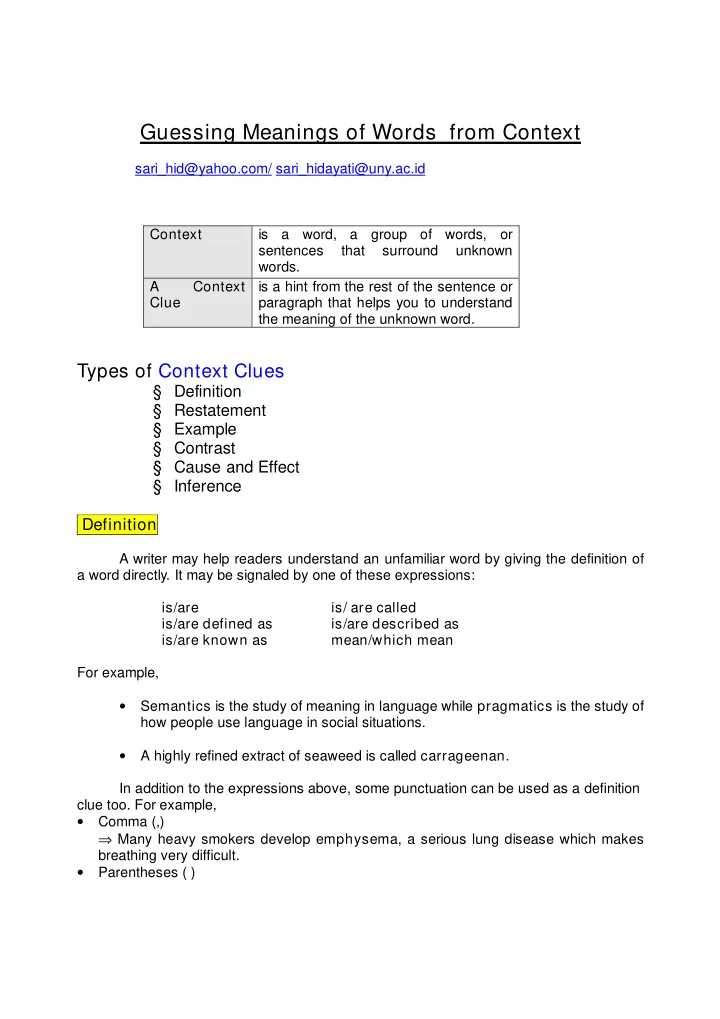

Guessing Meanings of Words from Context sari_hid@yahoo.com/ sari_hidayati@uny.ac.id Context is a word, a group of words, or sentences that surround unknown words. A Context is a hint from the rest of the sentence or Clue paragraph that helps you to understand the meaning of the unknown word. Types of Context Clues § Definition § Restatement § Example § Contrast § Cause and Effect § Inference Definition A writer may help readers understand an unfamiliar word by giving the definition of a word directly. It may be signaled by one of these expressions: is/are is/ are called is/are defined as is/are described as is/are known as mean/which mean For example, • Semantics is the study of meaning in language while pragmatics is the study of how people use language in social situations. • A highly refined extract of seaweed is called carrageenan. In addition to the expressions above, some punctuation can be used as a definition clue too. For example, • Comma (,) ⇒ Many heavy smokers develop emphysema, a serious lung disease which makes breathing very difficult. • Parentheses ( )
⇒ Paella (a Spanish fried rice mixed with small pieces of vegetables, fish, and chicken) is better served hot as breakfast. • Dash (-) ⇒ Carbon dating - a scientific method to determine the age of old objects - is generally accepted to be accurate. Restatement Some unknown words are probably restated by using another word which is more familiar to us. The signal words are as follows: or in other words that is (to say) i.e. For example, • A pseudonym or a penname is used to hide the identity of a writer. • Most members of the camel family are found in arid habitats; in other words, they are found in dry areas. Example Some examples are given to help readers understand the meaning of the unknown words. The examples usually follow the expressions like: such/such as like especially for example for instance including For example, • At night we sometimes saw some nocturnal animals, such as owls and bats. • Fabrics, like cotton, silk or polyester, can be bought at many stores. Contrast Writers often clarify their discussion by showing how one thing differs from another or by telling what something is not. The signals that help locate contrasting expressions are: but however although whereas not on the other hand yet
For example, • Challotte loves reading novels but Bridget despises it. • My sister thought the rock concert was scintillating, but I thought it was very dull. Cause and Effect Writers may also use cause and effect relationships to help readers find the meaning of unknown words even though the meaning is not directly given. The expressions which indicate cause and effect relationships of situations or events are: because consequently so therefore For example, • After a year in Scotland, she ran out of money; therefore, she had to look for a job. • At the party, I saw Susan sitting by herself. Probably it was because she did not feel like mingling with the other guests. Inference Sometimes context clues are not so clearly recognizable because they do not have clear signals. We must infer to determine the meaning of an unknown word by its relationship to familiar words. For example, • My neighbour is so affluent that he can afford an expensive sports car every year. Here the “so + adjective + that clause” is a reason + result. So affluent must mean rich.
Selected Bibliography Ediger, Anne and Cheryl Pavlik. 1999. Reading Connections: Skills and Strategies for Purposeful Reading. Hong Kong: Oxford University Press. Fredrickson, Terry L. 1994. Focus on Words. Bangkok: The Post Publishing Public Co., Ltd. Heaton, J.B. 1997. Writing English Language Tests. 8 th ed. New York: Addison Wesley Longman Limited. Hill, Jimmie and Michael Lewis. 1999. Dictionary of Selected Collocations. London: Commercial Colour Press. Pakenham, Kenneth J. 1998. Making Connections: An Interactive Approach to Academic Reading. New York: Cambridge University P
Recommend
More recommend